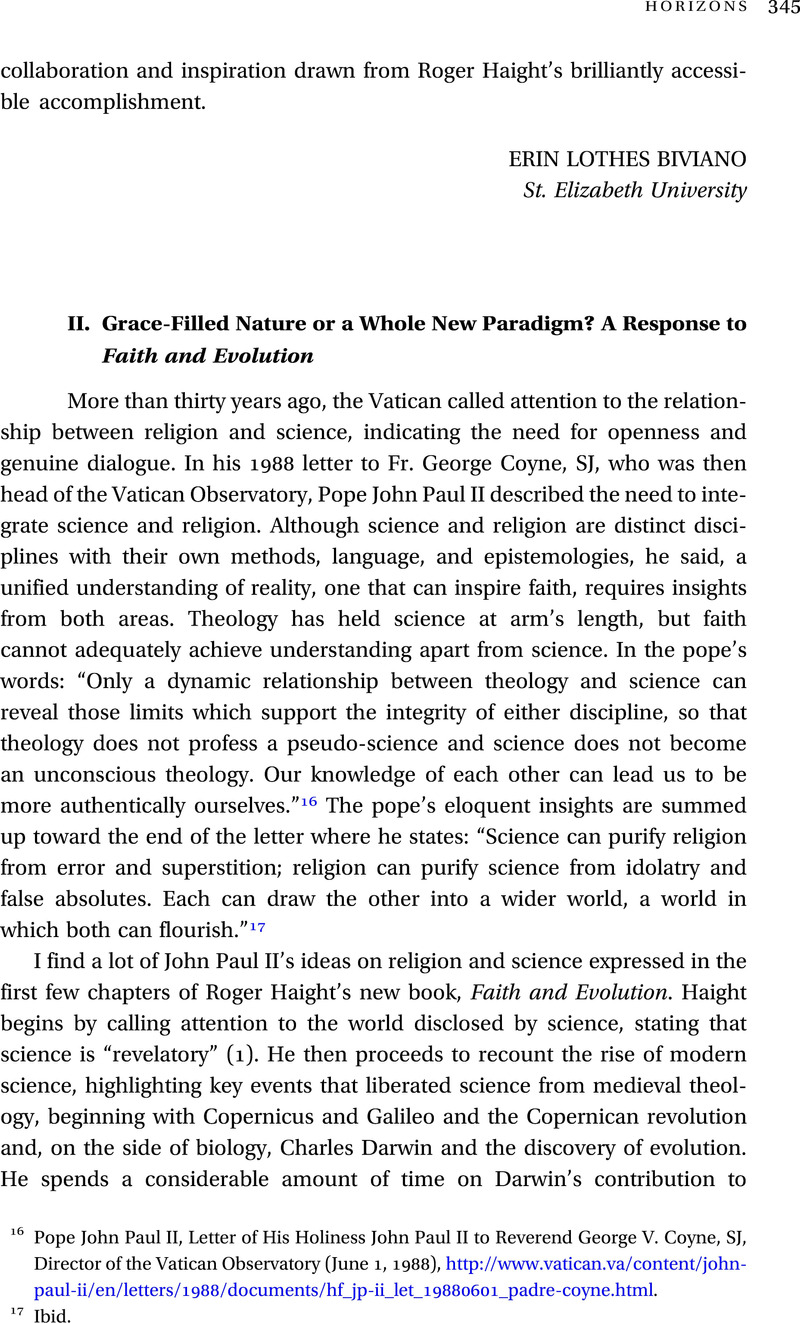No CrossRef data available.
Article contents
II. Grace-Filled Nature or a Whole New Paradigm? A Response to Faith and Evolution
Published online by Cambridge University Press: 15 December 2020
Abstract

- Type
- Review Symposium
- Information
- Copyright
- Copyright © College Theology Society, 2020
References
16 Pope John Paul II, Letter of His Holiness John Paul II to Reverend George V. Coyne, SJ, Director of the Vatican Observatory (June 1, 1988), http://www.vatican.va/content/john-paul-ii/en/letters/1988/documents/hf_jp-ii_let_19880601_padre-coyne.html.
17 Ibid.
18 Pierre Teilhard de Chardin, The Phenomenon of Man, trans. Bernard Wall (New York: Harper Row, 1959), 285.
19 See, for example, Joseph Bracken, SJ, “Foundational Principles for an Organically Constituted World,” Theology and Science 17, no. 1 (2019): 119–32; “A New Methodology for Christian Systematic Theology,” Zygon 54, no. 3 (2019): 575–87.
20 Cited in Cristina D'Acona, “The Liber de causis,” in Interpreting Proclus: From Antiquity to the Renaissance, ed. Stephen Gersh (Cambridge: Cambridge University Press, 2018), 142; Lawrence Dewan, OP, “St. Thomas and the Causality of God's Goodness,” Laval théologique et philosophique 34 (1978): 291–304.
21 On the influence of Avicenna on Aquinas, see John F. Wippel, “The Latin Avicenna as a Source for Thomas Aquinas's Metaphysics,” Freiburger Zeitschrift Für Philosophie und Theologie 37 (1990): 51–90; Deborah Black, “Mental Existence in Thomas Aquinas and Avicenna,” Medieval Studies 61 (1998): 41–79; Julie Ann Swanstrom, “The Metaphysics of Causation in the Creation Accounts of Avicenna and Aquinas” (PhD diss., Purdue University, 2013), https://docs.lib.purdue.edu/open_access_dissertations/58; David Burrell, “Thomas Aquinas and Islam,” Modern Theology 20, no. 1 (1994): 71–89; Joseph Kenny, OP, “Thomas Aquinas, Islam and the Arab Philosophers,” http://www.catholicapologetics.info/apologetics/islam/thomas.htm.
22 See, for example, the work of philosopher Alicia Juarrero, “Complex Dynamical Systems and the Problem of Identity,” Emergence 4 (2002): 94–104.
23 Barad, Karen, Meeting the Universe Halfway: Quantum Physics and the Entanglement of Matter and Meaning (Durham, NC: Duke University Press, 2007)Google Scholar.
24 See Gaylen Strawson, “Consciousness Isn't a Mystery. It's Matter,” New York Times, May 15, 2016, https://www.nytimes.com/2016/05/16/opinion/consciousness-isnt-a-mystery-its-matter.html.





